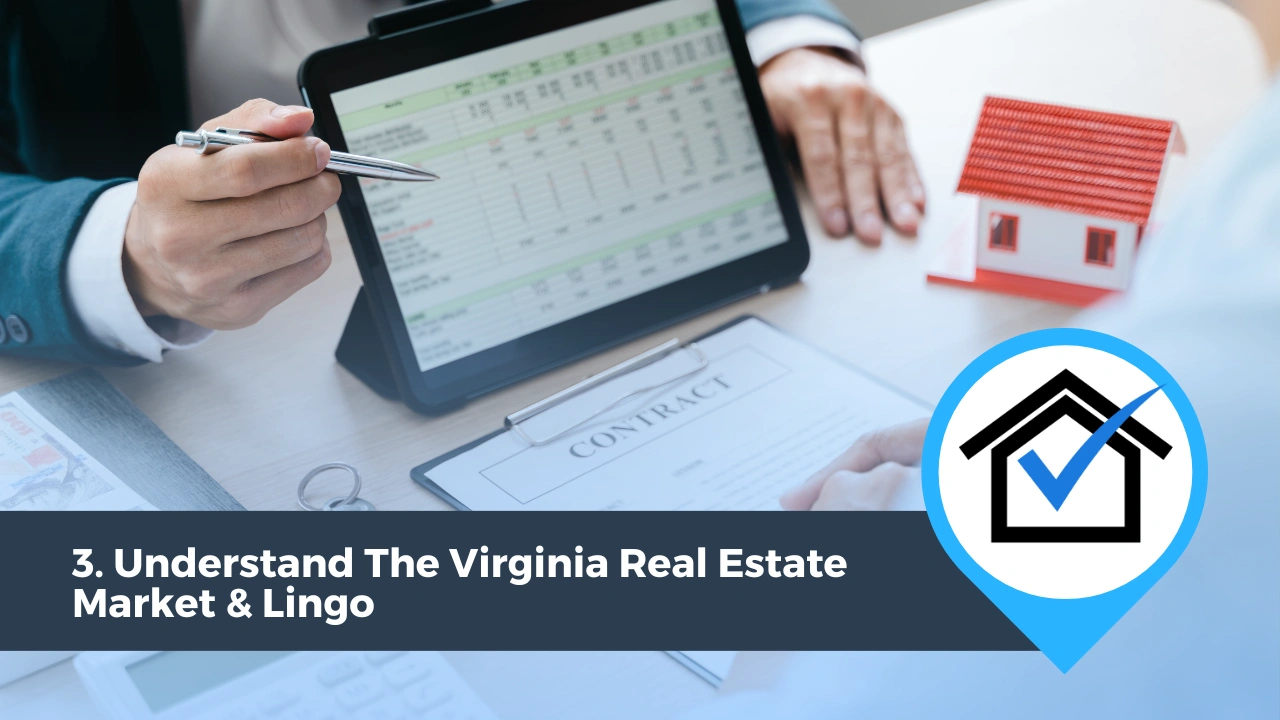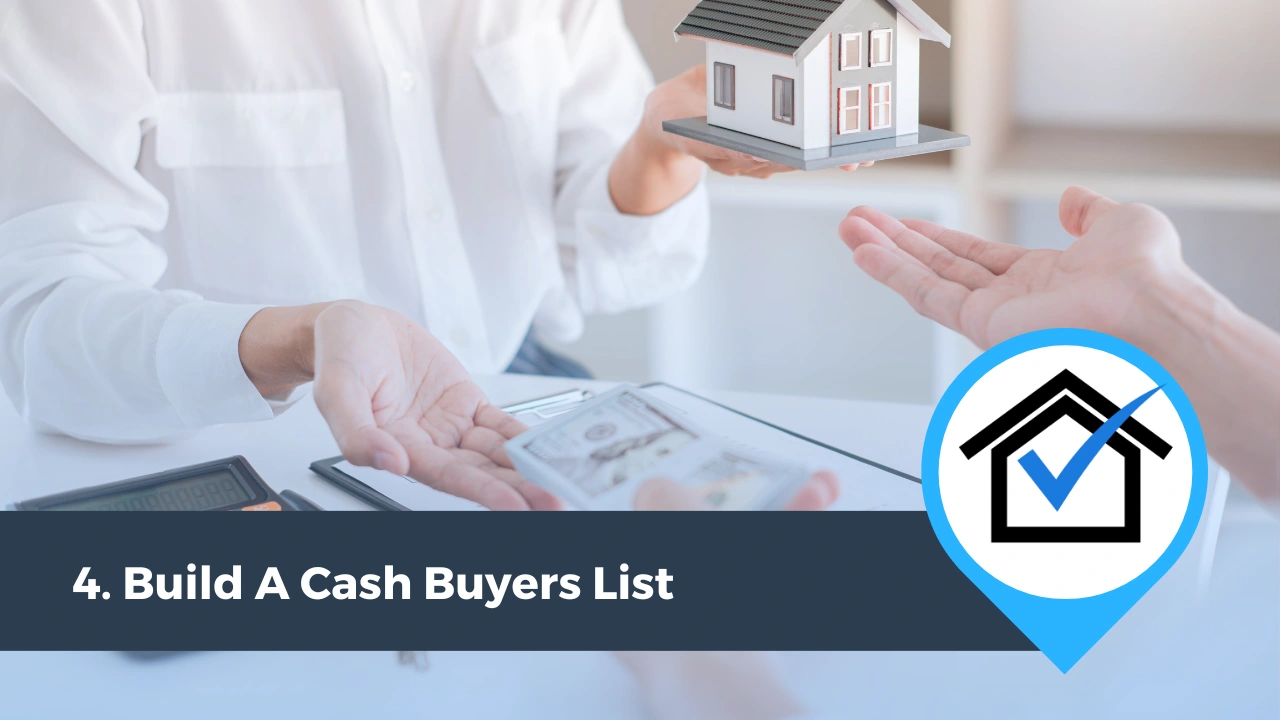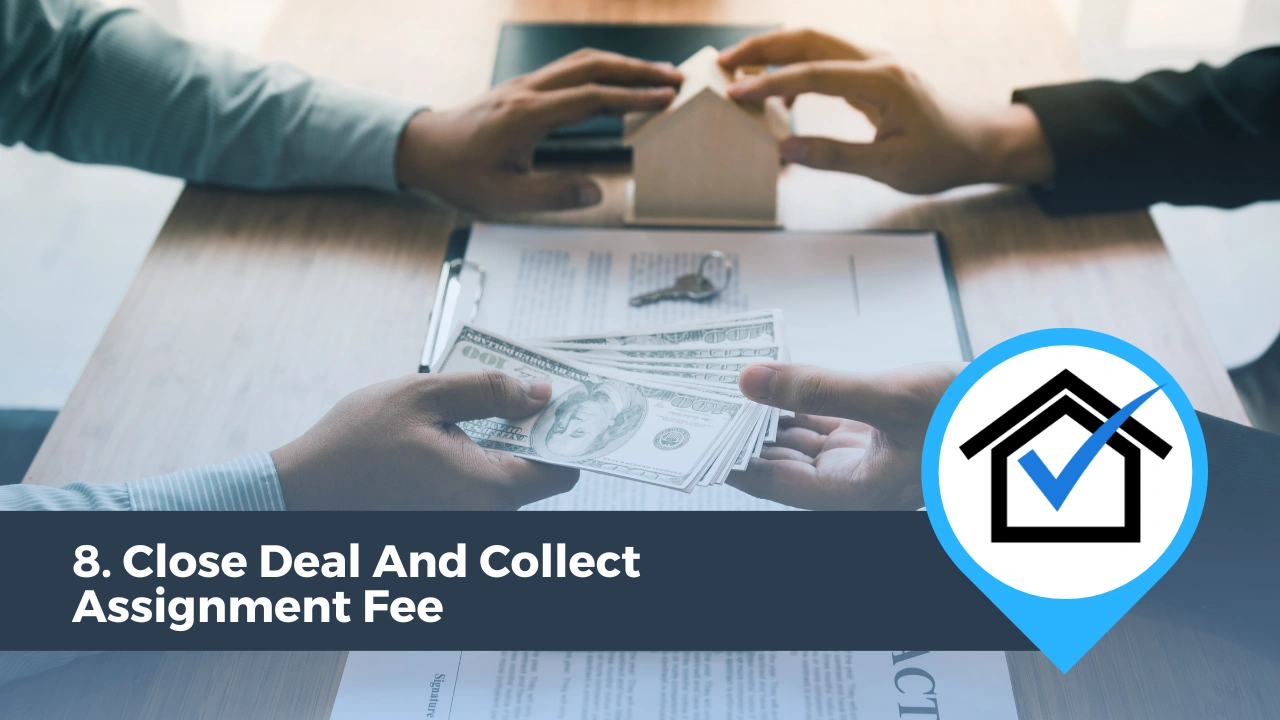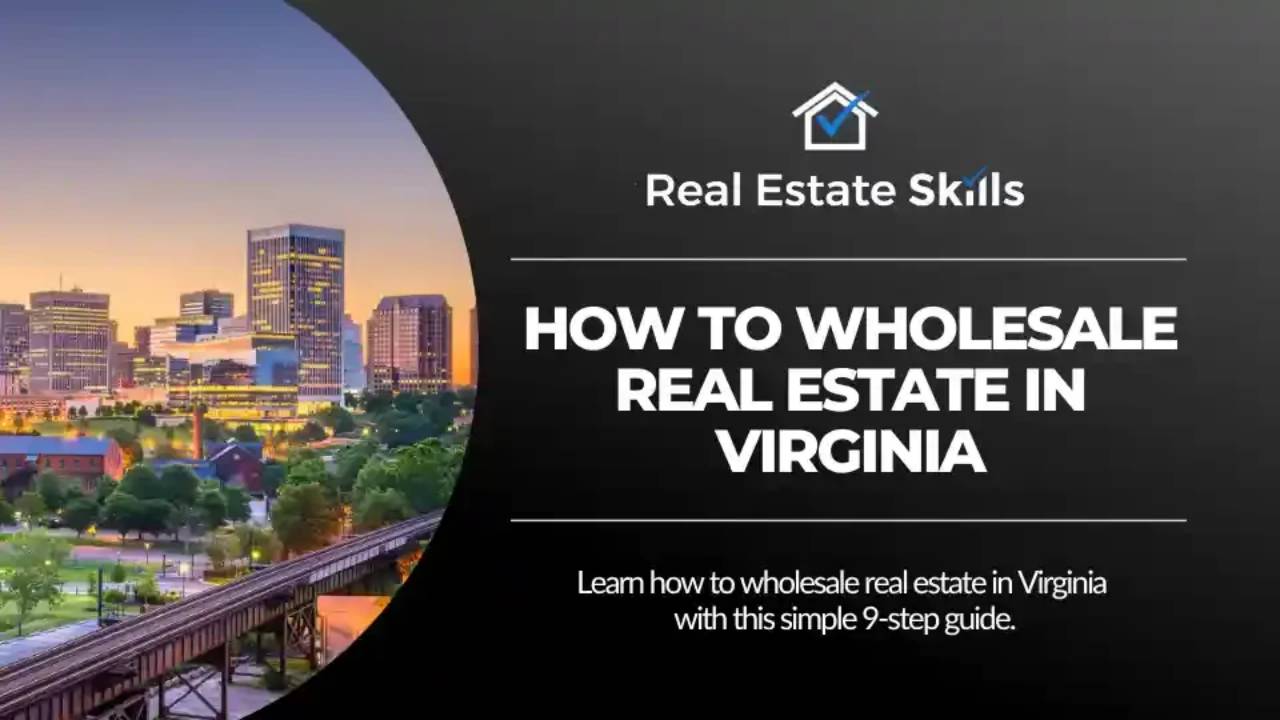
How To Wholesale Real Estate In Virginia: Step-By-Step (2026)
Dec 01, 2025
What: Wholesaling real estate in Virginia involves finding discounted properties, securing them under contract, and assigning those contracts to cash buyers for a profit without ever owning the property yourself.
Why: Because wholesaling can be a lucrative, low-risk way to start investing in Virginia’s real estate market. It lets you build capital, gain experience, and expand your investment network without needing large amounts of upfront cash or financing.
How: Follow the steps in this guide—research Virginia’s wholesaling laws, find motivated sellers, analyze deals, build your buyers list, and use the right contracts to close legally compliant wholesale transactions.
The Commonwealth of Virginia is in the mid-Atlantic section of the eastern United States, and northern Virginia is recognized to be part of the greater Washington D.C. area. If you are seriously interested in learning how to wholesale real estate in Virginia, know that this state offers a diverse real estate landscape. Virginia has something for everyone – from the Chesapeake Bay to Virginia Beach (its largest city) and the Blue Ridge Mountains.
More than 8.6 million people reside in the Old Dominion State, with about a third living within the greater Baltimore-Washington metro vicinity.
Like most markets, real estate across Virginia has experienced unprecedented levels of demand combined with an uncharacteristically low supply of homes for sale. The result is that median home prices in Virginia have been pushed upward by 8.5% year-over-year (as of Nov 2024).
Despite the ups and downs of a typical market, real estate wholesalers can typically find potential investments to turn a profit – they must have an understanding of where to look and how to do it. That being said, let's dive into the lucrative strategy of wholesaling Virginia. After reading our guide and downloading our resources, you will have the confidence to start investing in Virginia:
- What Is Wholesaling Real Estate?
- How To Wholesale Real Estate In Virginia (9 Steps)
- Is Wholesaling Real Estate Legal In Virginia?
- How Much Do Real Estate Wholesalers Make In Virginia?
- Wholesale Real Estate Contract Virginia: What To Expect?
- Do You Need A License To Wholesale Real Estate In Virginia?
- Is Wholesaling In Virginia Easy?
- Final Thoughts On Wholesaling In Virginia
If you’re serious about doing your first real estate deal, don’t waste time guessing what works. Our FREE Training walks you through how to consistently find deals, flip houses, and build passive income—without expensive marketing or trial and error.
This FREE Training gives you the same system our students use to start fast and scale smart. Watch it today—so you can stop wondering and start closing.
*Before we begin our guide on wholesaling real estate in Virginia, we invite you to view our video on How To Wholesale Real Estate Step by Step (IN 21 DAYS OR LESS)! Host and CEO of Real Estate Skills, Alex Martinez, provides a comprehensive, step-by-step guide for beginners to start wholesaling real estate!
What Is Wholesaling Real Estate?
Wholesale real estate is a specific type of real estate investment strategy that has become a preferred technique because it offers a short investment timeline – usually less than 30 days from contract to profit.
When a wholesaler is ready to begin, they search for wholesale houses and properties that are typically being sold by motivated homeowners – many facing financial difficulties that could be helped or solved by a quick sale.
These homeowners facing financial hardship are most likely to be willing to make a deal with a wholesaler because their situations leave them with little time and few options to sell the property.
When a wholesale deal has been struck, the wholesaler and the seller execute a real estate contract, a legally enforceable document that delineates the details of the purchase agreement, like the price, the closing date, and any other agreed-upon provisions. Wholesalers are primarily tasked with finding another investor (usually a fix and flipping professional) who understands the market and the property’s potential. This alternate buyer will be willing to pay more than the wholesaler’s contracted price.
The difference between the two prices is the wholesaler’s profit. Wholesaling real estate in Virginia begins with the following basic steps.
Read Also: How to Start Investing in Real Estate with No Money
Why Wholesale Real Estate In Virginia?
Wholesaling real estate in Virginia presents a strong opportunity thanks to its balanced housing market, with a median home value of $400,201, according to Zillow.
The state currently has 1,879 properties in foreclosure, 230 bank-owned properties, and 1,649 headed for auction, based on data from RealtyTrac, offering a substantial inventory of distressed properties for wholesalers to target.
This combination of a mid-range housing market and a high volume of off-market opportunities makes Virginia an attractive and competitive environment for real estate wholesalers aiming to generate consistent profits.
How To Wholesale Real Estate In Virginia (9 Steps)
To be an effective wholesaler, a real estate investment professional must simultaneously accomplish two primary tasks:
- Find potential investment properties to get under contract
- Build a wholesale buyers list filled with ready, willing, and able real estate investors.
Read Also: Wholesaling Real Estate: Step-by-Step PDFs [FREE DOWNLOAD]
Here's our simple step-by-step process for wholesaling real estate in Virginia:
- Partner With A Wholesale Mentor
- Learn Virginia Real Estate Wholesaling Laws & Contracts
- Understand The Virginia Real Estate Market & Lingo
- Build A Cash Buyers List
- Find Motivated Sellers & Distressed Properties
- Put Distressed Properties Under Contract
- Assign The Contract To A Cash Buyer
- Close Deal And Collect Assignment Fee
- Double Close When Necessary
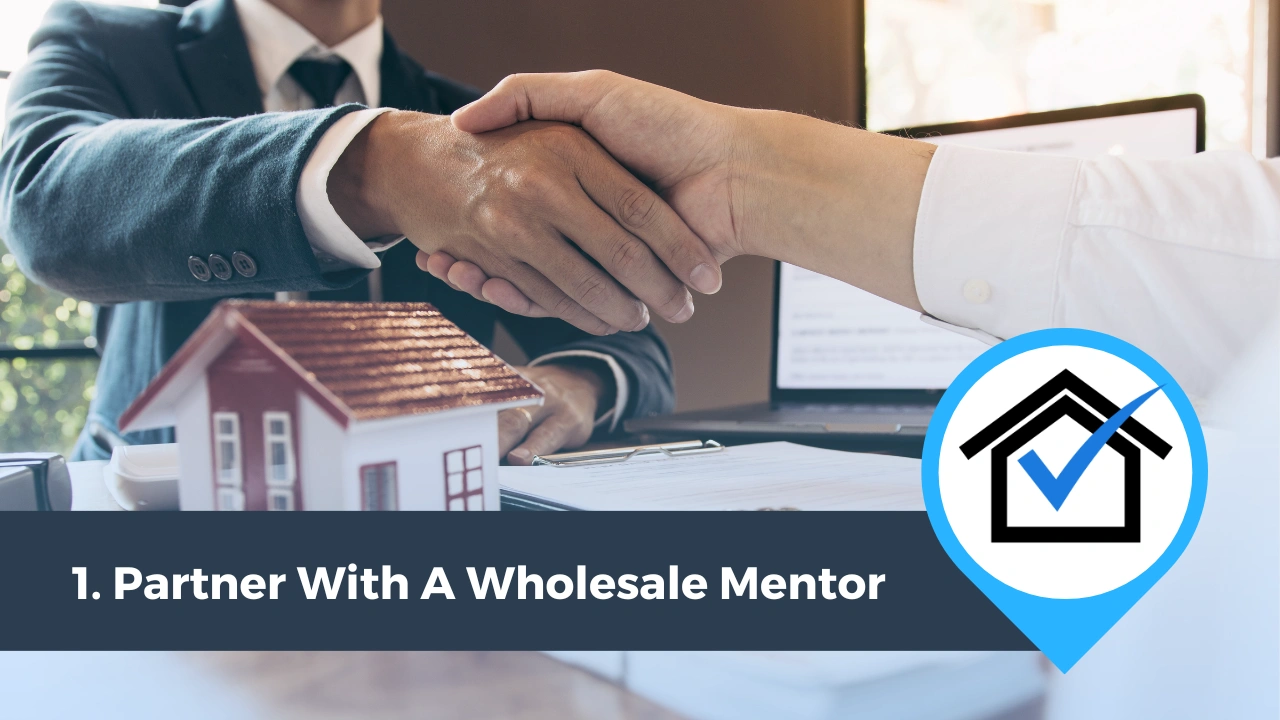
1. Partner With A Wholesale Mentor
If you are a new investor - new to real estate or real estate wholesaling specifically, finding a reliable real estate wholesale mentor can offer a great starting point. And it is never too early to understand the great benefit of understanding a painful or costly lesson made by someone else.
Investing in a real estate wholesaling course can provide the necessary foundation and mentorship to shortcut success in this business.
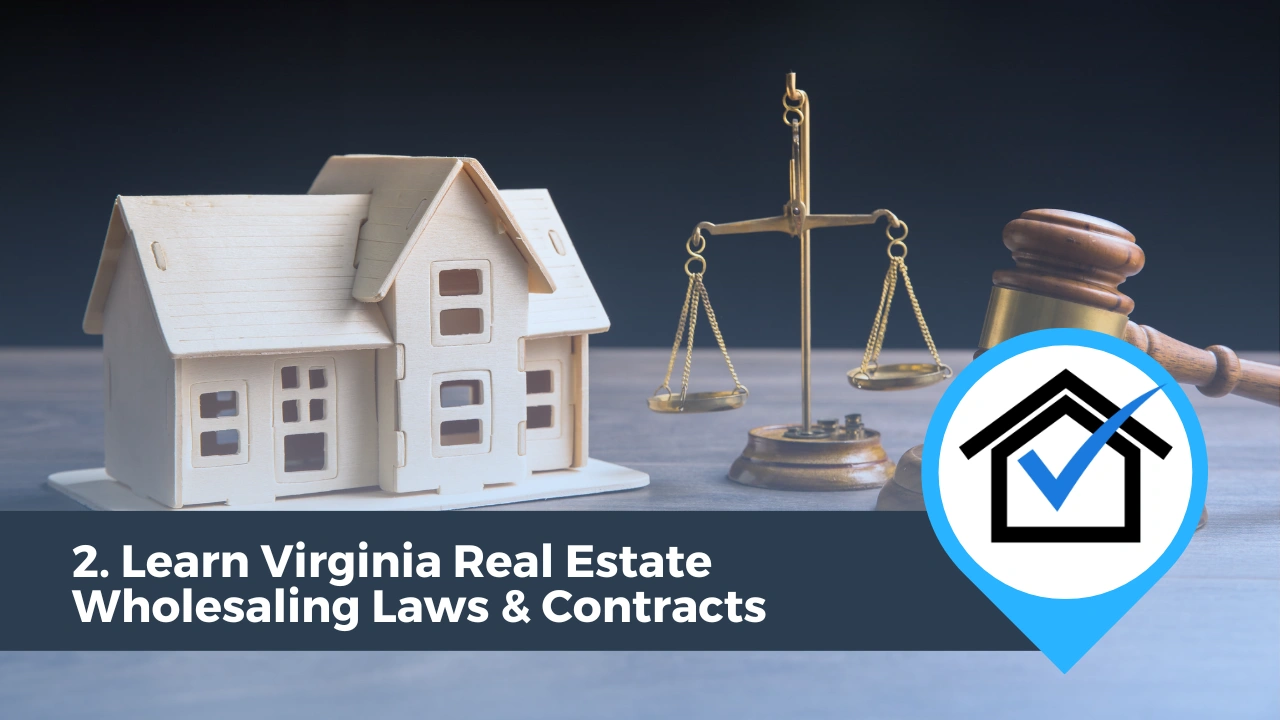
2. Learn Virginia Real Estate Wholesaling Laws & Contracts
Virginia administers its real estate, brokerage, and license law based on the Code of Virginia Law Title 54.1, Chapter 21 – Real Estate Brokers, Salespersons, and Rental Location Agents. Virginia law
The Virginia Department of Professional and Occupational Regulation (DPOR), headquartered in Richmond, is the state agency responsible for updating and enforcing real estate license law. The DPOR issues salesperson and broker licenses, which have a two-year expiration.
Another important contract is the Purchase and Sale Agreement, which establishes the initial terms between the wholesaler and the property seller. This contract should include specific language permitting assignment to a third party.
Additionally, it’s wise to include "right-to-market" clauses in contracts with sellers, as advertising the property publicly (such as on MLS) without consent can violate Virginia real estate laws. By understanding and properly using these contracts, wholesalers in Virginia can operate within legal boundaries and ensure smooth, compliant transactions.
Virginia Real Estate License Reciprocity
Anyone who holds a valid real estate broker or real estate salesperson license from another jurisdiction may apply for a Virginia real estate license by complying with certain requirements as stated in this administrative code 18VAC135-20-60.
Read Also: IIs Wholesaling Real Estate Legal In Virginia?
3. Understand The Virginia Real Estate Market & Lingo
One of the interesting things about real estate is how diverse markets can be even when located near one another. As you begin to wholesale real estate in Virginia, be certain you have an in-depth perspective on how your market operates.
The Virginia REALTORS Association is the commonwealth’s largest professional trade organization, with more than 35,000 members. They offer a wealth of information to licensees and the public. The state of Virginia is divided into these local real estate associations:
Virginia Is Not An Attorney-Close State
Real estate closings in the Commonwealth of Virginia can occur with a non-attorney settlement company. Virginia’s Real Estate Settlement Agents Act (RESA § 55.1-1000 thru § 55.1-1016) notes that several types of professionals (lawyers, settlement agents, etc.) are authorized to close a transaction. Note that these professionals authorized to close real estate transactions are required to become registered RESA agents,
Here’s a list of essential market indicators for real estate wholesalers to monitor when wholesaling in New Jersey:
-
Home Values: Track median home prices to understand market demand and identify profitable deals; rising values often indicate strong buyer interest.
-
Inventory Levels: Low inventory generally signals a seller’s market, making properties harder to find but potentially more profitable once under contract.
-
Days on Market (DOM): This metric shows how quickly homes sell; lower DOM reflects high demand and can signal quick flips and faster profits for wholesalers.
-
Market Trends: Assess if the market is appreciating or depreciating, as rising trends can increase profit potential, while declining trends might require faster sales.
-
Median Rent Prices: High rental demand can attract investor-buyers, making it a key figure for gauging property appeal for long-term holding or flipping.
-
Population Growth: Areas with rising populations typically see increased demand for housing, which can drive up property values and wholesaling opportunities.
-
Job Market and Economy: A strong job market boosts housing demand, while economic downturns may lower demand, influencing buyer and seller activity.
-
Foreclosure Rates: Higher rates may signal an opportunity for discounted properties, ideal for wholesalers targeting distressed home purchases.
-
Property Taxes: New Jersey has high property taxes, which can impact buyer interest; understanding local tax rates is crucial for accurate financial planning.
-
Interest Rates: As borrowing costs rise or fall, they can impact buyer affordability, influencing demand and the viability of deals.
By keeping an eye on these indicators, wholesalers can more accurately evaluate deal potential and market conditions in New Jersey.
If you are a new wholesaler, it may be beneficial to consult with a Virginia-licensed real estate attorney.
Read Also: Virginia Real Estate Classes: Wholesaling, Flipping & Licensing
4. Build A Cash Buyers List
As noted above, a wholesaler’s buyers list is their directory of potential end buyers and an essential part of a wholesaler’s business, so it is important to have multiple cash buyers available to contact and make sure you have a rock-solid list.
Note that most wholesalers’ buyers are typically other real estate professionals who are also looking to turn a profit on a wise investment property choice.
*Want to learn the proven strategies for finding cash buyers? View our video below, where Alex Martinez covers How To Find Cash Buyers For Wholesale Deals! [FREE & ONLINE]!
Without a robust list of potential buyers/investors, a wholesaler’s objective – to quickly reassign their equitable interest using an Assignment of Contract,&would become significantly more challenging.
5. Find Motivated Sellers & Distressed Properties
The digital marketplace – plus a few old proven search techniques, offers wholesalers many options when searching for potential investment properties.
Consider accessing a lender’s foreclosure or REO list. Many wholesalers find investments as expired or off-market MLS listings or properties advertised on Zillow, Redfin, and dedicated real estate wholesaling podcasts, among others.
Dive into real estate wholesaling with confidence. Download our FREE Wholesaling Cold Calling Script!
As noted above, most wholesalers find investments that include distressed properties or properties in disrepair - or motivated sellers interested in selling quickly.
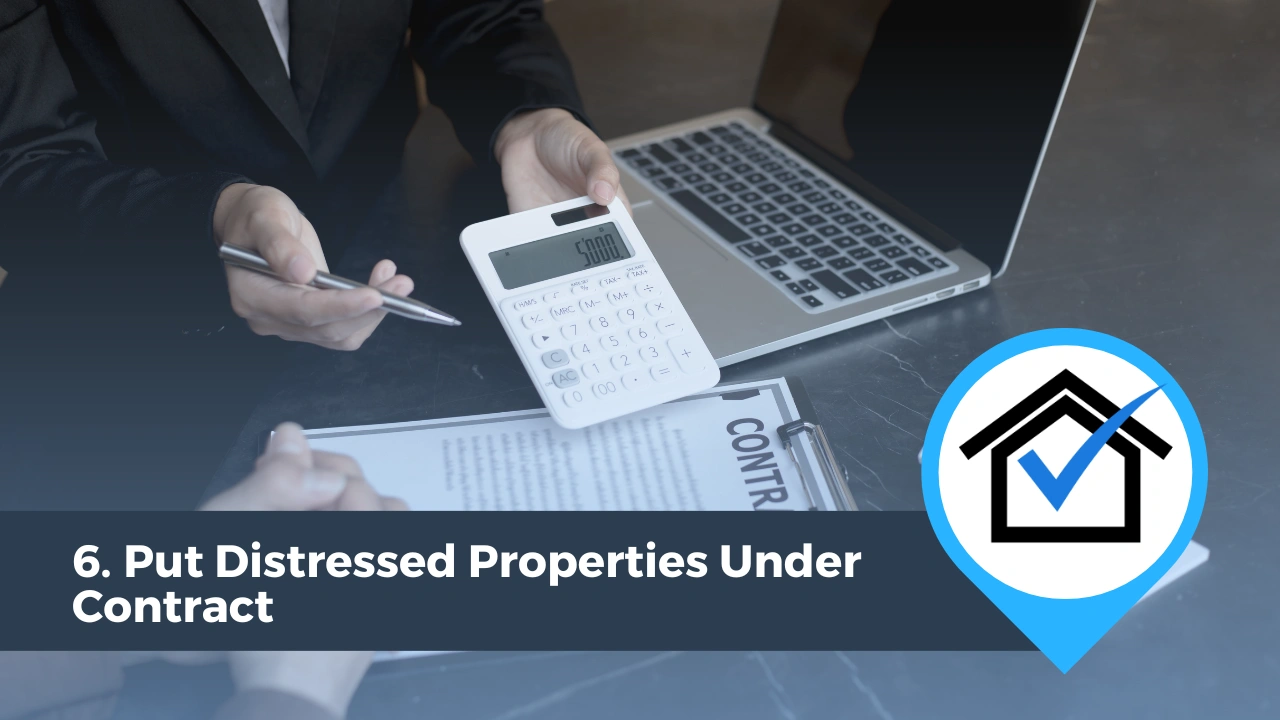
6. Put Distressed Properties Under Contract
Wholesaling is all about finding properties that meet their established investment criteria. The process is ongoing as wholesaling is best accomplished when a wholesaler can manage several real estate deals simultaneously – each at a different stage in the wholesale process.
Before executing a legally enforceable contract to purchase a property, wholesalers must take the time to research the basics regarding the property, its current price, and its potential future price – given predictable updates.
Wholesaler’s Investment Criteria Guidelines
Real estate investors generally use two primary investment metrics in determining a property’s potential as a wholesale investment:
- The 70% Rule: The 70% rule states that a Virginia wholesaler should pay no more than 70% of the After Repair Value (ARV). The ARV is the property’s expected market value – after the completion of updates and renovations.
- The Maximum Allowable Offer (MAO): The MAO formula considers the out-of-pocket costs and repair expenses to create a turnkey property. If there are repairs required, the MAO will always be less than the projected after-repair-value.
Before you determine your MAO, let's look at how to lock in that property.
Watch this video to learn how to confidently fill out real estate contracts and secure your deal.
Here's an example that will clarify these investment concepts:
A wholesaler is offered a property for $300,000 that, when updated, will have a value of $500,000. The wholesaler estimates that the property needs about $40,000 in updates and renovations to create an ARV of $500,000.
The highest or maximum offer a fix and flipper would pay for this particular property would be $310,000 – calculated as follows - $500,000 * 70% = $350,000 – MINUS $40,000 (the cost to repair the property) = $310,000 – or the Maximum Allowable Offer to the wholesaler.
If the wholesaler can execute a contract for $300,000, there would be a quick and simple $10,000 profit when assigning the wholesaler’s equitable rights to another end buyer.
[$310,000 - $300,000 = $10,000]
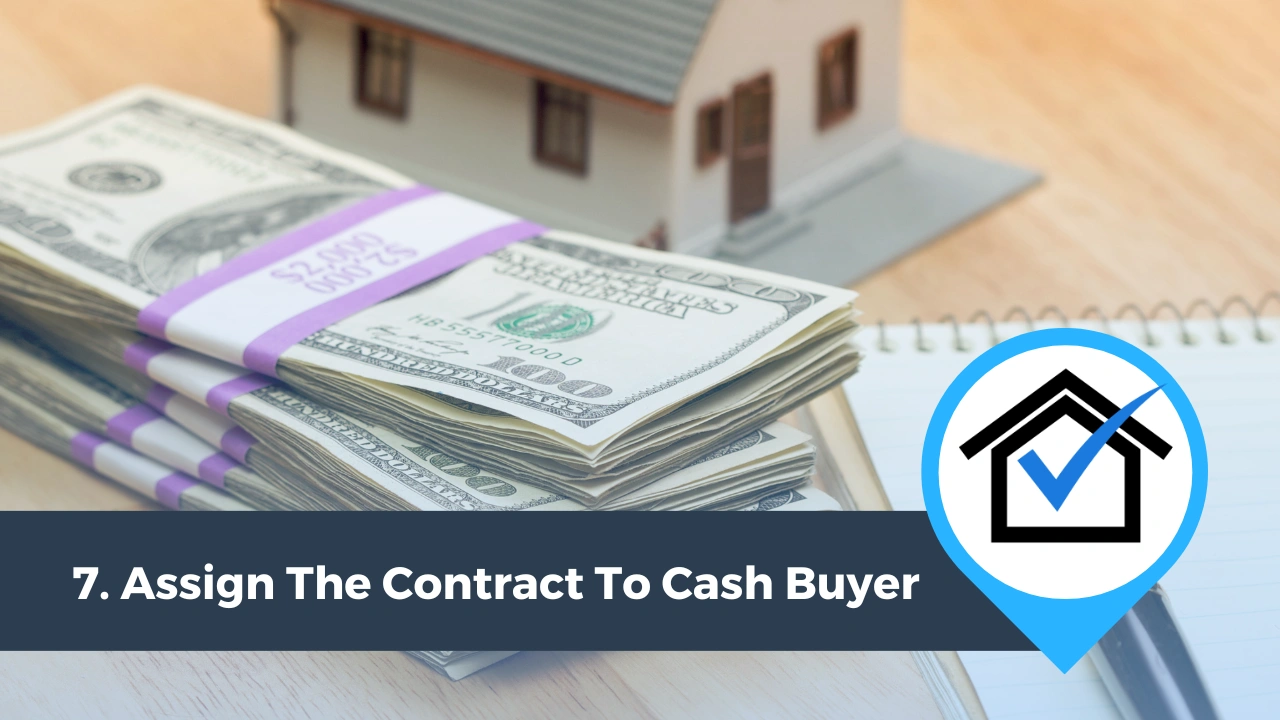
7. Assign The Contract To Cash Buyer
Most wholesalers prefer to assign their equitable rights to the new buyer before the first contract even closes. This is the preferred closing or existing strategy as it minimizes closing costs and time because the real estate wholesaler never takes title to the property.
The real estate wholesaler’s right to purchase the property (aka, their equitable interest granted by the Doctrine of Equitable Conversion) is the ONLY legal and marketable asset a wholesaler can sell/market without obtaining a Virginia real estate license.
A Virginia wholesaler’s equitable rights can be transferred using a legal document known as an assignment of contract. It facilitates the transfer of the right to purchase a property from the wholesaler to a new buyer.
The Assignment of Contract stipulates that an alternative buyer now has the right to purchase the home from the seller at the stated price in the assignment.
Read Also: Wholesale Real Estate Contracts: Download FREE PDF Templates
8. Close Deal And Collect Assignment Fee
Closing a deal and collecting the assignment fee is a crucial step in real estate wholesaling. Once you’ve negotiated a property under contract, the next phase involves finding a buyer willing to purchase the contract at a higher price. After securing a buyer, you present the assignment agreement, transferring your contractual rights to them. It’s essential to ensure all parties understand the terms and conditions to avoid disputes.
Typically, wholesalers aim for an assignment fee between $8,000 and $12,000 per deal. This range makes the effort and resources invested worthwhile, covering marketing, negotiation, and administrative costs. Once the buyer agrees, the transaction moves to closing, where the assignment fee is officially paid. Utilizing reliable title companies or real estate attorneys can facilitate a smooth closing process.
By effectively managing each step, wholesalers can consistently achieve profitable assignments, sustaining their business growth. The difference between the price in the original and assigned contract is the wholesaler’s gross profit which is called an assignment fee.
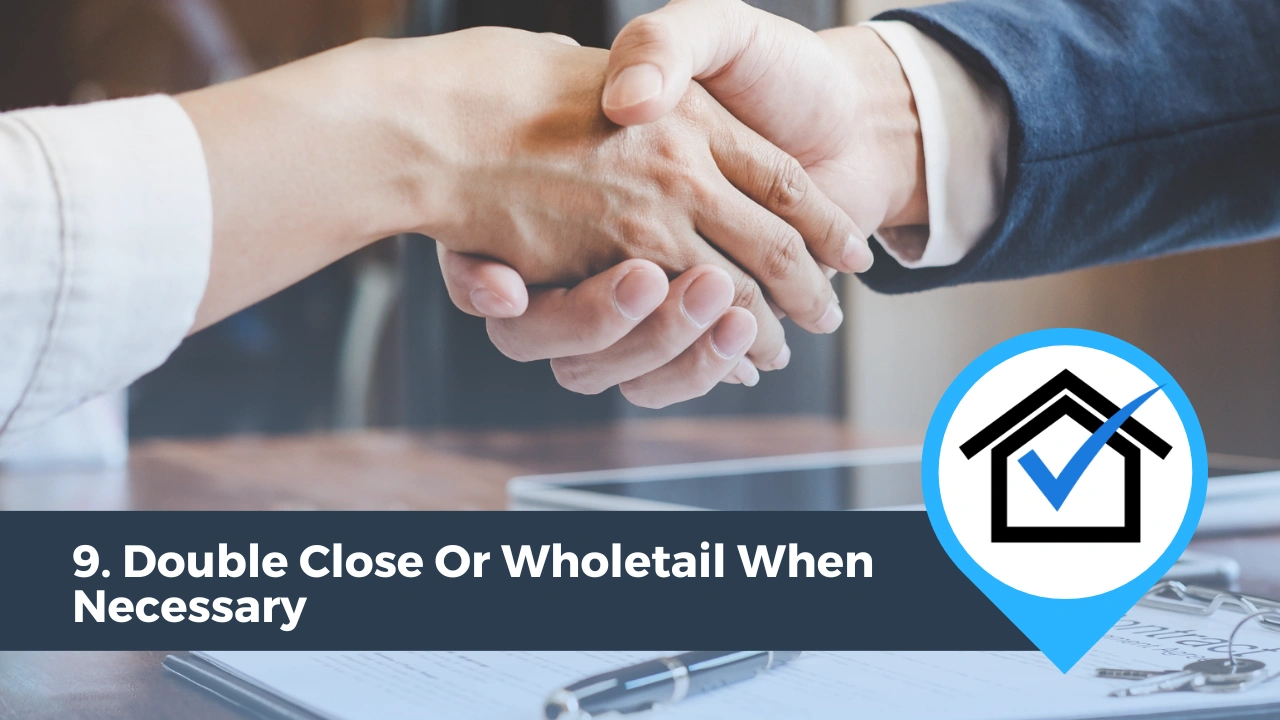
9. Double Close When Necessary
If a wholesaler in Virginia finds that the deal cannot close using an assignment of contract, they can, alternatively, use the Double Closing exit strategy.
In a double closing, during the first closing, the wholesaler acts as the buyer – completing the first transaction according to the original contract’s terms. During the subsequent closing, the wholesaler is the seller, selling the property to another buyer.
Some wholesalers prefer the Double Close exit strategy because their profit or capital gain does not need to be disclosed (to the seller or secondary buyer). Plus, there would undoubtedly be no need to obtain a real estate license in Virginia because the wholesaler is selling a property they own.
Of course, a double closing requires enough capital to buy the property (even if it is only for a few minutes) – although hard money lenders are willing to help if the wholesaler does not have personal funds to cover the temporary investment.
Read Also: How To Start Wholesaling Real Estate For Beginners In 7 Steps
*For in-depth training on real estate investing, Real Estate Skills offers extensive courses to get you ready to make your first investment! Attend our FREE Webinar Training and gain insider knowledge, expert strategies, and essential skills to make the most of every real estate opportunity that comes your way!
Is Wholesaling Real Estate Legal In Virginia?
Yes. Wholesaling real estate in Virginia is legal, but wholesalers must understand where the legal lines fall to avoid violating license or real estate laws.
As a reminder, real estate license laws can be found in the state’s legislative code – if you're wondering, is wholesaling real estate legal in Virginia, the state administers its real estate and license law based on the Code of Virginia Law Title 54.1, Chapter 21 – Real Estate Brokers, Salespersons, and Rental Location Agents.
HB 917 & How It Affects Wholesalers In Virginia
Virginia's real estate wholesaling landscape experienced a shift with the recent introduction of a new piece of legislation: HB 917.
This law broadens the definition of a real estate broker to include any “individual or business entity who sells or offers to sell, buys or offers to buy, negotiates, or otherwise deals in real estate contracts, including assignable contracts, on two or more occasions in any 12-month period for compensation or valuable consideration.” According to this new definition, anyone who assigns more than one contract a year must have a broker’s license.
Previously, you could operate as a wholesaler without a license. The typical process involves finding undervalued properties, securing contracts with sellers, and then assigning those contracts to end buyers for a fee. Under HB 917, however, this traditional wholesaling model might require a license if done more than once in 12 months for profit.
Here's where things get interesting: there might be loopholes. Structuring deals as double closings (where two separate closings happen, one between you and the seller, another between you and the end buyer) could be a way to potentially avoid needing a license. However, HB 917 is a new law, and interpretations by courts and regulators are still taking shape.
While wholesaling remains legal, it might require a license for frequent activity. To ensure you're operating within the legal boundaries, it's crucial to consult a Virginia real estate attorney for specific guidance. They can help you understand how HB 917 applies to your specific wholesaling approach and advise you on the best course of action.
Remember, this is a complex legal situation, and it's always best to err on the side of caution. Consulting an attorney will give you peace of mind and help you navigate the new Virginia wholesaling landscape effectively.
How Much Do Real Estate Wholesalers Make In Virginia?
One of the benefits of working as a professional real estate wholesaler is that a wholesaler's salary or earnings potential is unlimited.
While wholesaling and working as a real estate agent (or real estate broker) is clearly not the same job, both occupations are real estate and sales related. The following offers the latest median annual salary data for Virginia real estate brokers and real estate agents (41-9021 & 41-9022):
|
Number of Professionals in Virginia |
Median Annual Wage |
|
Real Estate Brokers – 1,580 |
$75,330 |
|
Real Estate Agents - 8,030 |
$69,190 |
Wholesale Real Estate Contract Virginia: What To Expect?
Real estate contracts are the legal instruments that detail a real estate transaction’s purchase terms. The information included in a Virginia contract will vary but generally include
- The property’s address and legal description.
- A small earnest money deposit is offered to the seller in good faith.
- Personal items that are included or excluded from the transaction.
- The purchase price and other relevant financial details, to name a few.
A well-written wholesale real estate contract is one of the most direct ones to protect yourself from potential legal problems. Virginia real estate wholesalers should seek legal advice when encountering situations that are either unfamiliar or beyond their capacity.
In addition to a solid purchase agreement, most wholesalers utilize an assignment contract to effectively transfer their rights to purchase real estate to the end buyer.
Do You Need A License To Wholesale Real Estate In Virginia?
No, if you stay within the legal limits of Virginia real estate and license law, you can wholesale real estate in Virginia without a state-issued license.
But remember that wholesalers have one asset to sell – their right to purchase (i.e., equitable interest) a property at agreed-upon terms to another buyer – for a different price. A wholesaler cannot sell real property (unless they are the rightful owner) without a real estate license in Virginia.
Generating profit wholesaling properties in Virginia is best accomplished by following these sound wholesale real estate business principles. First and foremost, a wholesaler must ONLY market or sell their equitable right to buy the subject property.
- A wholesaler’s actions and intent should be transparent and disclosed to all.
- A wholesaler must operate with integrity.
- A wholesaler should proactively manage the sellers' or homeowners’ expectations.
Most importantly, wholesale CANNOT sell real estate unless they hold a valid Virginia license, they are the current seller/owner or any one of the other legal exceptions denoted in Virginia license law.
Is Wholesaling In Virginia Easy?
Wholesaling is a nuanced real estate investment strategy that offers an entrance into the market with limited capital and a short timeline for collecting a profit.
However, its recent meteoric rise in popularity has driven more and more potential investors to the wholesale real estate arena, so it often pays to learn how to wholesale by enlisting the help of experienced professionals. A newer wholesaler may consider finding an experienced mentor and enrolling in the world-class Pro Wholesaler VIP Program.
With a step-by-step process and expert guidance, new wholesalers have a chance to clear up any misconceptions about the real estate wholesaling business as they ready themselves to learn how to start wholesaling real estate in Virginia. This will ultimately save new wholesalers time and allow them to make more money in the long run.
Final Thoughts On Wholesaling In Virginia
Wholesalers find purchase opportunities that allow them to enter the market with little to no capital.
However, the reality is that real estate wholesalers act like traditional middlemen operating in a capitalistic economy. But, instead of selling or marketing widgets, wholesalers market and sell their right to buy a property to another buyer – who is often another real estate professional who intends to renovate or update the property to sell to a retail buyer.
When compared to a typical flipper strategy, wholesaling is considered less risky because of the reduced potential for unexpected delays often caused by construction or permitting issues.
All investors must approach the wholesaling sector of the real estate business with prudence, transparency, and due diligence to ensure they do not violate existing Virginia law. Staying within Virginia law, wholesalers will find various lucrative wholesaling opportunities.
Check out our brand new free training on how we help investors all across the country wholesale and flip houses from the MLS using only a laptop and a cell phone.
If you’re serious about doing your first real estate deal, don’t waste time guessing what works. Our FREE Training walks you through how to consistently find deals, flip houses, and build passive income—without expensive marketing or trial and error.
This FREE Training gives you the same system our students use to start fast and scale smart. Watch it today—so you can stop wondering and start closing.
*Disclosure: Real Estate Skills is not a law firm, and the information contained here does not constitute legal advice. You should consult with an attorney before making any legal conclusions. The information presented here is educational in nature. All investments involve risks, and the past performance of an investment, industry, sector, and/or market does not guarantee future returns or results. Investors are responsible for any investment decision they make. Such decisions should be based on an evaluation of their financial situation, investment objectives, risk tolerance, and liquidity needs.

